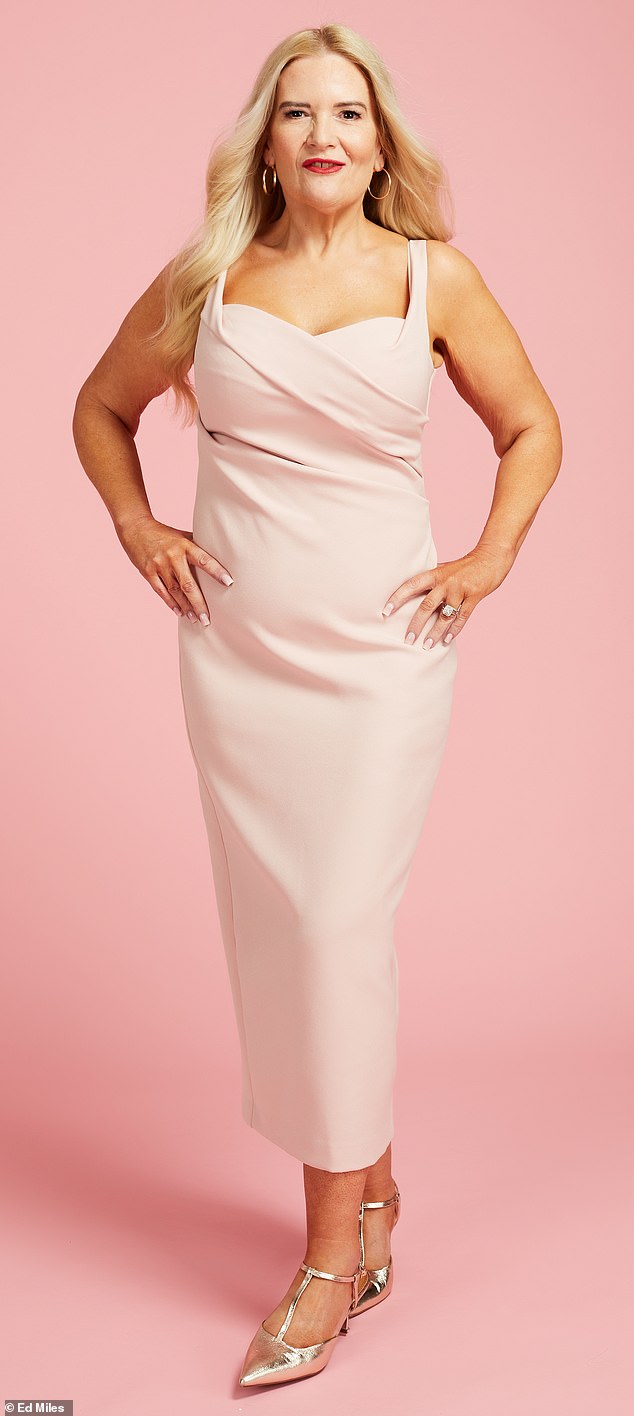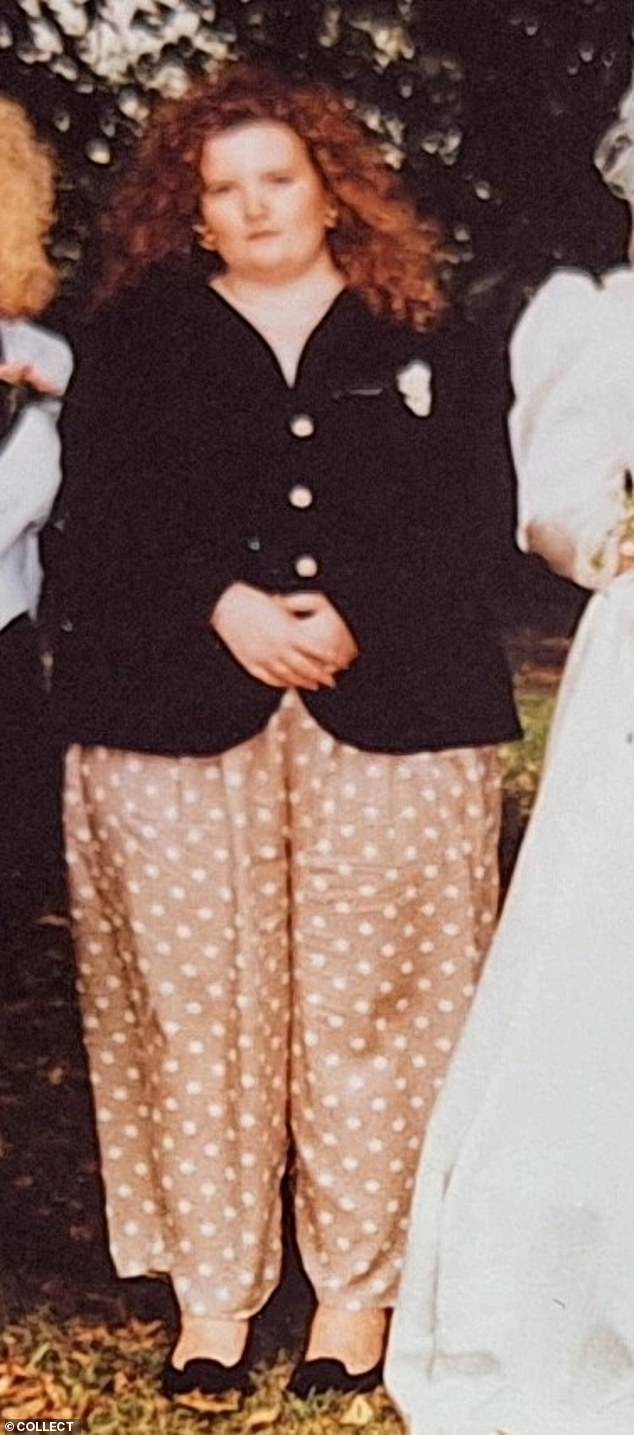Most mornings after working out at the gym, I’ll post something motivational on TikTok and Facebook.
Once chronically obese, I’m now down to a size ten and my followers often tell me how much my weight loss inspires them.
Yet over the past eight months, I have noticed something sinister creeping into their messages. Just before Christmas, I got the first one asking, ‘What brand do you use?’ I didn’t have a clue what this complete stranger meant and told her so. Instantly I got back: ‘Sorry, I mean which jab are you taking? You look amazing!’
I was speechless. Of course, I like that people compliment me, but my 9st figure is in no way down to Ozempic or Mounjaro. So it infuriates me when people just assume I’ve taken the easy way out of dieting, accompanying their comments with a conspiratorial winking face emoji.
It never fails to rile me when I’m simply lumped in with the rest of the mid-life jabbers – after all, there has been nothing lazy about my path to fitness.
On the contrary, my new figure is down to a change in mindset that took decades to develop and maintain. I drilled down and did my research. I wanted to understand why I went from a comfort eater in my teens to someone who was a food addict. That’s why, now 54, I still deliberately make positive choices about exercise and food every single day. Ones I will continue to make for the rest of my life.
No wonder I get so frustrated that jabs are seen as the norm. They are, to put it bluntly, a chemically induced starvation diet. There is no mindset change, no focus on working out and, other than a reduction in quantity, there are no changes to the types of foods jabbers eat.
Look, for the woman who has been labelled ‘fat girl’ all her life, I do get it. At first glance, these jabs seem like the best thing ever. But they raise so many red flags. They haven’t even been on the market for a decade, so it astounds me how quickly and blindly they’re being viewed as a magical elixir for middle-aged women.

Sarah Jane Clark’s weight-loss journey began in her 20s, when her doctor said she would likely not make it past 40

Sarah aged 24 and weighing 22st. She began exercising regularly and switched to a healthier diet and started shedding the pounds
Aside from my job as a mental health administrator, for three years I have also worked as a weight loss, food addiction and mindset coach. I know first-hand how dispiriting it is to be classified as obese. At 24, I weighed 22st and wore a dress size 28. I was told by my GP I likely wouldn’t make it to 40. If there had been a bridge near his surgery when I walked out humiliated and in floods of tears, I would have jumped off it.
Being obese, the fat friend, pointed at in the street and laughed at by strangers impacts every aspect of your life.
So I understand how desperate some women are to lose weight. What I can’t condone is their refusal to put the work – both physical and psychological – into achieving it.
Since that first message last year, I’ve received others and comments on social media posts (especially when I use before and after pictures) asking, ‘Hun, what are you using?’ or ‘I can’t wait to get started on my jab journey too!’
Yet when I explain there were no ‘quick fixes’ for me, they simply don’t want to know. Deep down, they prefer to abdicate all personal responsibility and place the power outside of themselves into the liquid in the syringe.
They don’t want to hear that weight-loss jabs are part of the diet industry. That what they do is about starvation, flicking off a switch in your brain so you’re not eating. And when you stop jabbing? I have no doubt the majority will find the weight returns.
Indeed, study after study backs this up. Researchers at the University of Oxford published research last month which found that on average people who lose weight on GLP-1 drugs returned to their original weight within 10 months of stopping them.
I’ve had a life-long battle to stay slim and my obese, uneducated 20-something self would have embraced the jab culture.
At 11, while I wasn’t fat, I started to develop a woman’s body – boobs, waist, bum – and I thought I needed to lose weight. At 14, I went on my first diet and was introduced to the concept of ‘good food’ and ‘bad food’. My weight issues spiralled from there, the toxic restriction taking me from comfort eating to binge eating.
At 24, I hadn’t weighed myself for four years; I didn’t have a mirror at home and avoided looking at my reflection. I assumed I was 16st, so it was a wake-up call to discover I was 22st.
My then-husband worked nights so when he left, I’d pop a pair of trainers on and go out when no one could see me. I’d walk for half an hour every night and as the scales began to show I was losing weight, I started to feel better about myself. Until then, I was drinking full-fat coke and coffee with milk and two sugars, living off oily takeaways. I started eating fibre-rich jacket potatoes with baked beans. It made me feel healthier. Instead of starving myself, I did it gradually and felt positive.
When I had my daughter aged 25, I walked everywhere pushing her pram. When I had my son a year later, I got into the habit of cooking from scratch, too. By 28, I’d lost 6st. At 32, I had saved up enough to undergo surgical removal of my saggy skin. The full circumference abdominoplasty cost £10,000, followed by skin removal on my inner legs six years later. The surgeon remarked that I was the only patient he’d ever operated on who had achieved my level of weight loss without resorting to a gastric band, sleeve or some sort of appetite-suppressing chicanery.
I lost a further 3st in my 30s, and then got into running in my 40s. I also finally faced up to the fact I was a food addict and got myself a mindset coach who helped me fully understand my relationship with overeating. This inner work is crucial.
It troubles me when people breezily note that jabs cut the ‘food noise’. When jabbers first started talking about the relief of it quietening down, my antenna picked up because that’s food addiction, pure and simple.
The WHO published a report last year that found 20 per cent of Britons meet the criteria for food addiction. In cases like this, a jab is just a plaster and won’t treat the underlying reason why we eat the way we do. I had to work on myself and my self-confidence. Embracing this way of life means you will lose friendships, it will cost you relationships. It cost me two marriages, as I became a different woman – one who wanted more out of a partner.
But I’m proud to be one of only three people in every 1,000 who actually sustains weight loss.
I understand some will take against my cri de coeur and denounce me as a party pooper at best, or someone riddled with jealousy about women cheating their way to weight loss.
It’s more that I worry what they’ll all do when they reach their goal weight. Will they stay on the jabs forever and keep injecting the drugs when we still have no firm knowledge what long-term use will do?
If you’ve jabbed today, I totally understand your desperation and unhappiness at being very overweight, and I would never judge you. But not all of us have found solace in a needle. And it is annoying that others just presume I have.
After decades of unflinching work, my body is a jab-free zone and, by goodness, I’m proud of myself.
Find ‘Step By Step with Sarah-Jane’ on Facebook and TikTok.












